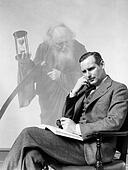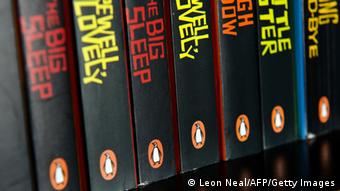Developed initially as a way of producing picture books, Blurb has bulked up in novel and magazine publishing, and sees itself as the future of the industry – and a massive threat to traditional publishers.
“The volume we’re seeing globally is unbelievable,” says Gittins. “We’re entering the golden age of publishing.
“Back in Dickens’s day, everybody self-published, and it only became stigmatised when mass publishing came along and you weren’t picked.
“Even five years ago, there was a stigma attached to self-publishing. It was like it was too bad because you couldn’t get a book deal.
“That’s gone now. There are way too many stories now of people making books themselves. Now the audience can pick.
“Is there a lot of rubbish out there? Yes. Has there always been rubbish out there? Yes. But I view this as something that’s just beginning. It’s huge. We’re going through the roof.”
Funded through $19m (£11.8m) of investment by US venture capital firms Anthem Venture partners and Canaan Partners, which now own slightly more than 50pc of the company, Blurb was profitable in its second year.
It employs 125 staff, including 15 in London, and expects turnover of $90m this year.
Its online platform gives authors tools to input their copy and pictures and choose layouts, but the company outsources printing to seven contract commercial printers in the US, the UK, Australia and the Netherlands.
It has expanded from its bespoke photobook roots, now also offering offset printing for authors wanting more than 750 copies. Blurb, which this year bought magazine self-publishing platform MagCloud’s assets from Hewlett-Packard, allows authors to choose either print copies or ebooks.
It enables them to warehouse, distribute, sell and promote their books, and has distribution deals with Amazon and Apple.
Unsurprisingly, Gittins is gloomy about the prospects for traditional publishers.
“Traditional publishing is becoming a hits business like Hollywood,” she says. “They want to bank on box office, so if you’re a mid-list author, God help you if your last book didn’t sell a bunch, because you’re not going to get a deal.
“If you’ve never published before and are handsome or beautiful and 21 and have a big social network, they might take a flyer on you because your book could be the next Hunger Games.
“And if you’re a bestselling author, they’ll take you, too, because you’re the Brad Pitt of the publishing industry and people will just buy your book because it’s by you. But for everyone in the middle, good luck.
“That’s a huge population of people coming to Blurb now because they’ve had it up to here. They know they’re not going to get any marketing. There are no more advances so they’re not even making any money on the front end and they figure they’re going to have to do all the marketing anyway.”
She believes that traditional publishers will continue to go out of business, while others will merge or be taken over. “It’s inevitable,” she says. “Some won’t be able to adapt and get to enough scale.
“If they’re not smart about their distribution as bookshops close, if they’re not technologically savvy or decide to invest in becoming technology companies, it will be increasingly difficult. Publishers have to become technology companies.”
Before Blurb, Gittins worked at Eastman Kodak, then ran several start-ups including Personify and Verb. After selling Verb, she returned to her photographic hobby and wanted to produce 40 photobooks but had difficulty getting them published, so brought together desktop publishing, print-on-demand services and an e-commerce engine.
Blurb’s idea was popular for photobooks, cookbooks and architectural books and novels. Then Hollywood studios such as Disney and Pixar started using it to make books about their films to give to crews at the “wrap” party.
The firm now prints books and magazines for brands including Lexus and Nike.
About 60pc of its business still comes from authors, but the greatest growth is in the commercial sector.
It has competition, both from independents such as Smashwords andLulu.com, and from Amazon’s CreateSpace print-on-demand publishing arm and from Apple’s iBooks authoring tool for ebooks.
However, Gittins is confident that no competitor replicates all the advantages of Blurb’s model.
“Our price includes our margin so whatever price you put on your book, you retain 100pc of the mark-up,” she says. “If the price of printing your book is £5 because you’re going to order a few thousand and you’re going to sell that book for £25, we literally would send you £20 every time somebody buys a copy.”
Blurb also allows authors to sell their books through the Blurb.combookshop and has a partnership to distribute its authors’ books through Amazon for a 15pc fee – much lower than authors could negotiate personally.
It also has 5,000 ebook titles on sale in the Apple iBookstore, and there’s an initiative to link authors with editors, ghostwriters, copywriters, illustrators and designers.
“We’re the YouTube of the publishing industry,” says Gittins. “We have a whole different model, all online, all very different but there’s a symbiotic relationship with the publishing industry. There are a number of Blurb authors who are getting picked up by traditional publishing.”
Will Blurb also get swallowed up that way? “There will be an exit,” admits Gittins. “Venture capitalists want to get paid eventually. Both options are on the table. We’re being approached by private- equity funds and also by strategic trade players who may have a Blurb-sized hole in their offering.
“We’re growing 20pc year-on-year so if we continue that, you could imagine that an initial public offering is not out of the question. My goal as the CEO is to create options.”
Gittins believes many people could one day have their own book, as well as their own Facebook page.
“It’s part of of your personal brand,” she says. “Entrepreneurs are known for telling a good tale but this is actually one where we’re overachieved. It’s grown faster than I expected.”
Get the Writers Welcome Blog on your Kindle here




